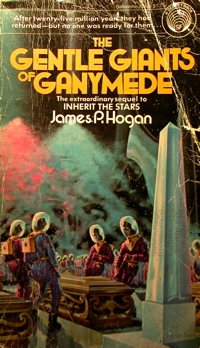 Author: James P. Hogan
Author: James P. Hogan
Started: 14 Dec 2005
Finished: 26 Dec 2005
246p / 13d
19 p/d
So from pop Physics to an old school 1978 era hard scifi paperback. This kind of story really excited me as a teenager. There is practically no plot. Here, let me give it a shot:
- Scientists investigate old alien wreck
- The aliens show up unexpectidly
- People make friends with the aliens
- The aliens visit Earth and like it
- The aliens decide to leave again
Yup, that’s it. The whole plot. Now, that is not all there is to the book, it just isn’t a plot driven book. It is pretty much all about exploring an idea and some scientific “what ifs”. Over the course of the book the author goes into more detail and reveals more of the puzzle as his characters go through the investigative process. But mostly we have exposition. I kept seeing the big flashing “exposition” sign as I went through the book. Whole discussions that you would read but think, these characters would not actually discuss this in this way, they are reviewing facts both would know. This conversation is for the reader’s benefit only.
But that’s OK. This is a sequel to Inherit the Stars. And then there are three more in the series after these two, the most recent of which was published just this year. I’d read the first three as a teenager. Haven’t ever read the last two. Together they tell the story of scientists uncovering the past history of the solar system. The biggest surprise being the true origins of humanity and how they interacted with a race called the Minervans in pre-historic times. Then it explores some of the impacts of what happens when the two species meet again. At least that’s where it is as of the first two books.
It didn’t capture me quite so much as when I was young, but the whole construction of the scenerios and the slow unwrapping of what happened still facinates. As I said, it isn’t about the plot, it certainly isn’t about the characters, both of those are just the bare minimum needed to support a construction that will allow the exploration of a few scientific ideas. “What would an intelligent species act like if it evolved a non-predator species”. “What would the process be to unravel information about a past society if we found just a few remnants”. Etc. You don’t really need the story part, but it makes it a little more “fun” than if it had just been written as an academic paper. But yet, it is that academic speculation that is the core and what makes it fun and worth reading.